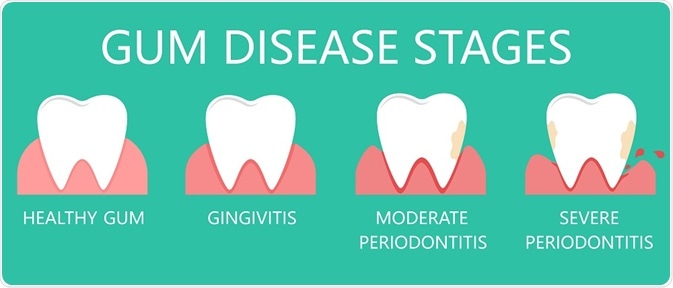Periodontitis and diabetes are both classified as chronic disorders. Periodontitis is an infection of the gums manifesting in both mild and severe forms, and diabetes is a metabolic disorder leading to a spike in blood sugar levels.
Research has indicated a two-way relationship between these two conditions; while diabetes increases the chances of developing periodontitis, the onset of the latter condition makes it a greater challenge to control the blood sugar levels of the affected person.
 Algirdas Gelazius | Shutterstock
Algirdas Gelazius | Shutterstock
What is periodontitis?
The early stages of gum disease are referred to as gingivitis. It causes the gums to become inflamed as a result of food lodging between the gums and the teeth, leading to the formation of tartar. Gingivitis can be cured with professional tooth cleaning and medication; however, untreated gingivitis can flare up to cause periodontitis. Periodontitis is thus an exaggerated form of gingivitis which involves both the gums and supporting structures like bone.
Certain predisposing factors like positive family history, inappropriate plaque removal, and uncontrolled diabetes levels can cause mild periodontitis to turn into a severe form.
 diluck | Shutterstock
diluck | Shutterstock
How are diabetes and periodontitis interrelated?
There is a bidirectional relationship between periodontitis and diabetes. The latter causes a severe form of periodontitis, which in turn results in complications associated with diabetes. Actually, periodontitis itself is regarded as one of the complications of diabetes.
Individuals who suffer from periodontitis have a higher risk of developing diabetes. Studies also suggest that individuals who suffer from Type 1 diabetes and have periodontitis are more likely to develop ketoacidosis, retinopathy, and neuropathy.
One case-controlled study also suggested that diabetics with periodontitis have a higher risk of complications such as proteinuria, stroke, transient ischemic attack, attack, angina, myocardial infarction, and heart failure when compared with patients who have mild periodontitis.
Significant periodontal attachment loss and bone loss is known to occur in patients with higher blood sugar levels as against those with an overall lower glycemic index. Alveolar bone loss can be up to 11 times higher in patients with uncontrolled Type 2 diabetes.
Taken together, these studies indicate the higher incidence of diabetes complications in patients with periodontitis, especially the severe form.
What biological mechanism links diabetes and periodontitis?
Though much research has been conducted to explore the relationship between the two conditions, the exact nature of the causal mechanism has not emerged.
Microorganisms like Actinobacillus actinomycetemcomitans, Bacteroides forsynthus, Porphyromonas gingivalis, Prevotella intermedia, Treponema denticola, and Eikenella corrodens are involved in periodontal conditions.
The higher incidence of periodontitis in diabetes is most likely due to elevated glucose levels in the saliva and crevicular fluid which encourages the proliferation of these microbes. The resulting flare-up of inflammatory and immune phenomena in diabetics causes accelerated periodontal loss and destruction of oral tissue.
Does treating periodontitis lower blood sugar levels?
Periodontitis is a chronic condition and appropriate treatment is required to reduce the microbial growth responsible for accelerating periodontitis. Tooth scaling and root planing are part of the treatment process, and are instrumental in the removal of the biofilm which in turn reduces the activity of the pathogens responsible for periodontitis.
Various clinical studies have confirmed that treating periodontitis with such non-surgical procedures combined with antibiotics reduces the severity of periodontitis which in turn regulates blood sugar levels. It is not yet clear that periodontitis subsides once blood sugar levels stabilize. However, it is clear that the prognosis for periodontal health after dental treatment is much better for patients whose blood sugar levels are well controlled.
Further Reading
Last Updated: Feb 15, 2023